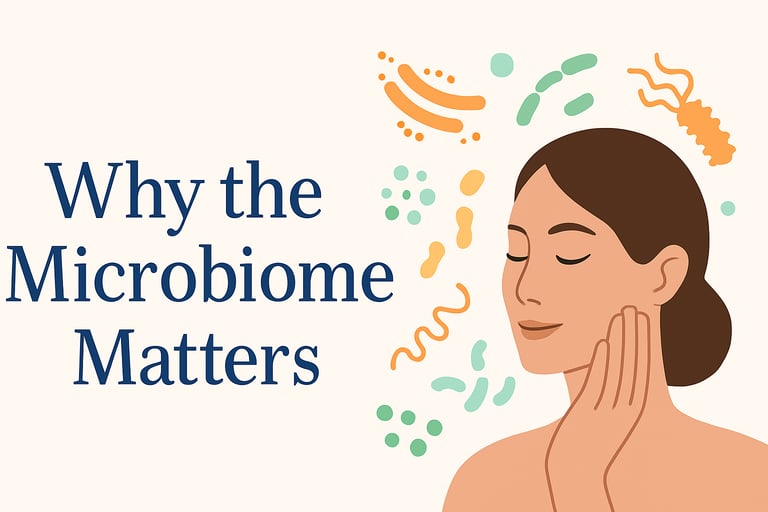Everything You Need to Know About the Microbiome and Your Skin
Because healthy skin starts with a healthy balance.
5/26/20252 min read


🌿 What Is the Skin Microbiome?
Your skin isn’t just a surface — it’s a living ecosystem.
Every inch of it is home to billions of microorganisms including bacteria, fungi, and viruses. This invisible community is known as your skin microbiome — and it's just as important as your gut health.
When this delicate balance is thriving, your skin glows.
When it’s thrown off? You might see breakouts, redness, sensitivity, or even chronic conditions like eczema.
So yes — the microbiome is a big deal in skincare. And the more we learn about it, the clearer it becomes: supporting your skin’s microbiome is one of the best things you can do for lasting skin health.
🧬 Why the Microbiome Matters
The skin microbiome isn’t just "there" — it works hard to keep your complexion in check.
Here’s how:
✔️ Acts as a natural shield against harmful bacteria
✔️ Regulates inflammation and maintains healthy pH
✔️ Helps your skin retain moisture
✔️ Speeds up healing and barrier repair
✔️ Calms sensitivity and prevents flare-ups
Basically? A balanced microbiome = strong, calm, glowing skin.


🚩 Signs Your Skin Microbiome May Be Off-Balance
Your skin will tell you when something’s wrong — if you know how to listen.
Look out for:
Sudden breakouts or irritation
Redness and sensitivity, especially to your usual products
That tight, stinging feeling post-cleanse
Flaky patches or excessive oil
Skin that just won’t calm down, no matter what you use
These are all signs your skin’s natural barrier (and microbiome) may need support.
❌ What Disrupts the Microbiome?
Modern skincare can sometimes be too harsh — even when it means well.
Here’s what can throw off your microbial balance:
Over-cleansing or using foaming cleansers with sulfates
Alcohol-heavy toners and astringents
Over-exfoliating with strong acids
Antibiotics (oral or topical)
Cortisone/steroid creams
Pollution, stress, lack of sleep
Low hydration levels and stripped lipid barrier
✅ How to Support a Healthy Skin Microbiome
The good news? You don’t need a full skincare overhaul — just some mindful swaps and additions:
Choose gentle, non-stripping cleansers
– Avoid foaming agents like SLS or drying alcoholsStop over-exfoliating
– 2–3x per week max, depending on your skinUse products with probiotics, prebiotics & postbiotics
– Yes, your skin loves fermented ingredients too!Feed your skin with natural, microbiome-loving formulas
– Think rice ferment, kombucha, inulin, and ceramidesHydrate and moisturize well
– A strong barrier helps good bacteria thriveDon’t fear a little oil or “friendly” bacteria
– Not all microbes are bad — many are essential
🧴 Hero Ingredients to Look For
When shopping for microbiome-friendly skincare, keep an eye out for:
Lactobacillus ferment – probiotic that soothes and strengthens
Inulin / Alpha-glucan oligosaccharide – prebiotics that feed the good guys
Fermented rice or soy – natural postbiotic powerhouses
Ceramides, squalane, fatty acids – nourish the skin barrier
✨ Editor’s Picks: Skincare That Loves Your Microbiome
Gallinée Foaming Cleanser
→ Gentle, pH-balanced, full of prebioticsThen I Met You Essence
→ Packed with fermented rice, probiotics, and soothing hydrationAurelia Probiotic Serum
→ Calms inflammation and supports skin resilienceSoonJung Barrier Cream
→ Fragrance-free, simple, and ideal for sensitive or reactive skin
🌱 Final Thoughts: Balance Over Perfection
Your skin doesn’t need to be perfectly clear — it needs to be balanced.
Instead of scrubbing away every imperfection, try supporting your skin’s natural ecosystem. Let your microbiome do what it’s designed to do: protect, repair, and glow.
✨ Treat your skin like a garden — not a battlefield.
🛍️ Explore microbiome-supportive, clean skincare at Dealaha.com
Quality You Can Trust
Discover handpicked, high-quality products that support a healthier, more intentional lifestyle.
Contact
Stay in the Loop
© 2025 Dealaha™ All rights reserved.
